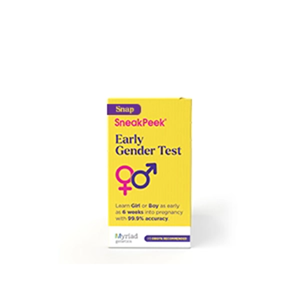Published on January 11th, 2021 and Updated on January 15th, 2024
Check out SneakPeek Gender Test to find out your baby’s gender as early as 6 weeks at over 99% accuracy1!
There are few things sweeter than a sleeping baby. Their tiny mouths slack. Their brand-new eyelashes lightly flutter as they dream. In fact, most new parents would agree that the only thing sweeter than a sleeping baby is a sleeping baby that sleeps all night long.
Yes, sleep never felt quite as precious before becoming the parent of a newborn. Through late-night feedings and early morning diaper changes, you may find yourself wondering, “When do babies start sleeping through the night?”
About two-thirds of babies start sleeping through the night at around six months, but every baby is a little different. Your infant might be a champion snoozer early on in her development. Or, she may have periods of wakefulness during her sleep cycle until she’s about one.
But whether your child is sleeping all night depends on a variety of factors.
What does “sleeping through the night” mean?
Newborns are sleep champions. In fact, a newborn baby can sleep 16-18 hours in a day. However, those hours are broken up into bite-sized chunks, snoozing for as long as 2 hours or as short as 20 minutes.
Sleeping through the night entails a solid 6-8 hours of z’s for your little one without waking for feedings or diaper changes.
The Key to All-Night Sleep: Decrypting Your Baby’s Circadian Rhythm
A circadian rhythm is the body’s natural clock. It manages your sleep cycle, so you can get plenty of shuteye and be ready for the day ahead. But your baby’s circadian rhythm has yet to acclimate to life outside of mom’s womb, where sleep and wake times were sporadic.
It’s a bit like post-birth jet lag! Your baby has to get used to Post-Womb Standard Time.
Once your infant is born, a few factors can help their circadian rhythm develop.
- Light – The Sleep Foundation regards light as the most important external factor that affects a baby’s sleep. Light enters the iris, and a special group of cells on the retina send a message to the brain to stay awake. Light also halts the production of melatonin, a hormone that tells your body to sleep.
- Age – Just like it takes time to shake jet lag when you’re traveling across the world, it takes time for your baby’s circadian rhythm to internalize this new schedule of wakefulness during the day and sleep during the night. The older your baby gets, the more accustomed he’ll be to sleeping at night.
- Feeding schedule – During the first few months of life, your baby is a growing machine! From birth to six months, your child will most likely double her birth weight. And that weight includes healthy fat accumulation, bone growth, and muscle development. But growing is tiring and hungry work, which is why your child initially will require feedings every few hours, even through the night.
Constant wakings for milk or formula will be one of the bigger factors preventing your child from sleeping through the night. But those feedings are essential for her healthy development. As her growth rate naturally slows, she’ll need less frequent feedings, meaning she’ll be able to sleep for longer stretches of time.
The Sleep Stages of Infancy
As your baby grows, his eating and sleeping needs will change according to his body’s natural development. The first six months see the most drastic changes in your baby’s sleep stages.
Birth to Four Months
Often called the “fourth trimester,” the first four months of your child’s life is defined by erratic sleep patterns. Pediatricians call this time the fourth trimester because your child is transitioning from life inside the womb to life outside of it. That adjustment period means your child’s sleep schedule will be sporadic and may even change from week to week!
A few other elements contribute to your newborn’s erratic sleep schedule:
- Stomach size – At this stage, your baby’s stomach capacity is at its smallest, and therefore will need refilling more often throughout the day—and the night.
- Moro reflex – Also known as the “Ah! What was that! MOM!?” effect, the Moro reflex is your child’s startle reflex. When a new sensation—like cold, a noise, or indigestion—strikes, your baby’s Moro reflex wakes her as an evolutionary protection mechanism. The younger your child is, the more sensitive her Moro reflex will be.
- Self-soothing – In the womb, all of your baby’s needs were catered to. He was warm, fed, safe, and didn’t have to worry about sudden noises waking him up. As a newborn, your child has no self-soothing skills to calm himself back to sleep. The soothing job is all up to the parents for a while until your child learns to soothe himself back into slumber.
You can help introduce your baby to his new time zone slowly with a few tricks like:
- Spend some time in the morning light – Remember, darkness tells your baby’s brain it’s time to sleep, and light tells her brain it’s time to be awake. So during your first morning feeding, bring your baby into the sunlight so her brain can associate wakefulness with light— though don’t let your baby sunbathe for too long! Your baby is still developing her skin’s natural UV protection, the pigmented skin cells known as melanin.
- Watch for signs of drowsiness – At this stage, you probably can’t wait until your baby has the ability to say things like, “Mom, I’m crying because I’m tired, I want to go to sleep now.” But you may be surprised that your child’s communication methods right now are just as clear. Look for signs of tiredness like:
- Increased fussiness
- A lack of engagement in activities
- A little grumpy squawking
When you see any of these signs, you can swoop into action to put your baby to bed.
- Keep nighttime activities dark – Even if your baby needs a nighttime feeding, try to keep the room dark to ease the transition back to sleep. If your baby needs a nap during the day, be sure he’s tucked in where it’s dark. His brain will slowly make the connections that sleepy stuff happens in the dark.
During this stage, your baby’s sleep will look like this:
- Total Sleep in 24-Hour Period: 16-18 hours
- Daytime Sleep: 8 hours
- Nighttime Sleep: 8 hours, with feedings throughout
- Sleep Duration: Between 20 minutes or up to 2 hours
Four to Six Months
By about three months, your child will be more used to the world outside the womb. She may sleep for a bit longer than in her fresh-out-of-Mom days. Her stomach will also have grown a bit so she can go longer between feedings, her Moro reflex is less sensitive, and she may even have picked up on a few self-soothing techniques.
At this point, your baby’s body may have gotten the most important memo for her circadian rhythm: darkness means sleepy time, light means wakey time.
But it always helps to keep reinforcing those rhythms with a few techniques like:
- Stick to a bedtime routine to help guarantee consistent wake and sleep times
- Ensure your baby’s sleep space is dark, comforting, and free of distractions
- Take naps in dark, comfy places
For 4-6 month olds, sleep habit averages look like this:
- Total Sleep in 24-Hour Period: 12-17 hours
- Daytime Sleep: 4-5 hours
- Nighttime Sleep: 10-12 hours
- Sleep Duration: Up to 2 hour naps, 10-12 hours of overnight sleep
Six to Nine Months
When do babies sleep through the night? By about six to nine months!
For sleep-deprived parents, the six-month milestone may feel like a whole new world. Your baby may be capable of more self-soothing than ever. And now that his growth rate has slowed down a bit, he can sleep for much longer stretches of time.
At this stage, your biggest obstacle to your baby’s sleep schedule? Separation anxiety. After six months of bonding and associating parents with good things like food, warmth, snuggles, and entertainment, can you blame your kid for never wanting to stop playing with you? Even if your child was sleeping through the night before this stage, he may experience sleep regression and “backslide” when he realizes how awesome Mom and Dad are.
But with a few tips and tricks, you can help ease your baby into slumber.
- Create a goodbye ritual – Babies take well to routines, even when they’re desperate for Mom to stay for extra cuddles. A goodnight ritual can help tell your baby it’s sleepy time—and that’s okay. Do a few calming activities that soothe your baby (and you; babies aren’t the only ones who get separation anxiety). That could mean:
- Take a bath
- Singing a lullaby
- Reading a picture book
- Giving your baby a big hug and a kiss
- Keep your cool – Babies can smell fear—okay, not really, but they do pick up on emotional signals from Mom and Dad. Smile when you say bye-bye, even if your baby is having a mini-meltdown.
- Play peek-a-boo – Peek-a-boo is a hit with your kid at this age, because to them, your smiling face isn’t tucked behind your hands—it’s just gone! Who knows where! And then you open your hands and poof—you’ve come back, like magic. Peek-a-boo may teach your child that though Mom and Dad may be out of sight, they’ll always come back.
At this stage, your child’s sleep will look like this:
- Total Sleep in 24-Hour Period: 12-15 hours
- Daytime Sleep: 2-5 hours
- Nighttime Sleep: 10-11 hours
- Sleep Duration: Up to 2 hour long naps, up to an 11 hour night sleep
Understanding when babies sleep through the night is a journey influenced by their individual growth, development, and acclimation to life outside the womb. With factors such as circadian rhythms, feeding schedules, and age playing a vital role, most babies begin sleeping through the night by six months, bringing a sense of relief and a bit more sleep to their new parents’ life.
Sources:
- Healthline Parenthood. Help! When Will My Baby Sleep Through the Night? https://www.healthline.com/health/when-do-babies-sleep-through-the-night
- The Sleep Foundation. Light and Sleep. https://www.sleepfoundation.org/bedroom-environment/light-and-sleep
- Parents. How to Handle Separation Anxiety in Babies. https://www.parents.com/baby/development/separation-anxiety/how-to-handle-baby-separation-anxiety/
- What To Expect. When Will Your Baby Sleep Through the Night? https://www.whattoexpect.com/first-year/sleeping-through-the-night.aspx

Shop Our Products
SneakPeek aims to provide the most accurate and up-to-date information to help our readers make informed decisions regarding their health before, during, and after pregnancy. This article was written based upon trusted scientific research studies and/or articles. Credible information sources for this article are cited and hyperlinked.





